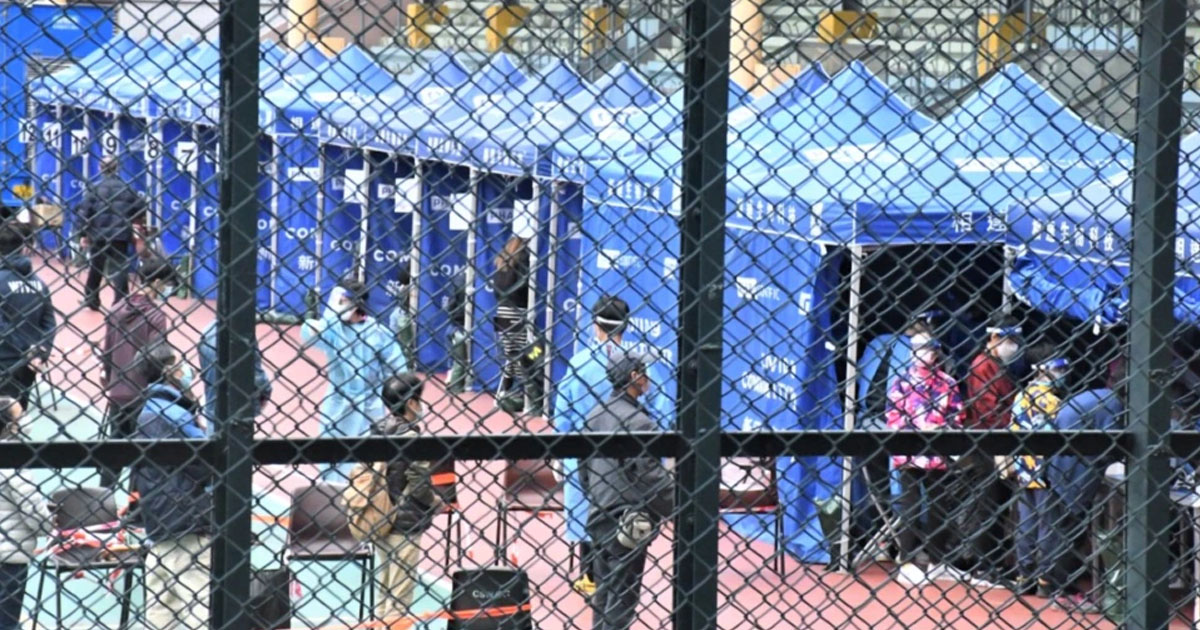Due to the crisis of the epidemic, Hong Kong’s push for a nationwide forced inspection may affect the success or failure of Carrie Lam’s re-election

The epidemic situation in Hong Kong continues to be severe under the dynamic clearing policy. The Hong Kong government has decided to implement nationwide testing and force Hong Kong people to undergo three nucleic acid tests per person. The outside world has questioned that the Hong Kong government’s anti-epidemic model lacks autonomy. The health of citizens is not the primary consideration. Some analysts believe that whether national testing can effectively curb the epidemic may become the biggest variable in Chief Executive Carrie Lam’s bid for re-election.
The number of daily confirmed cases in Hong Kong is now at its highest level in two years. Although the Hong Kong government has further tightened anti-epidemic measures since February 10, the daily number of confirmed cases remains high.
Due to the crisis of the epidemic, Hong Kong’s push for a nationwide forced inspection may affect the success or failure of Carrie Lam’s re-election
In order to control the epidemic as soon as possible, the Hong Kong government has implemented a “Vaccine Pass” from February 24, covering restaurants, wet markets, supermarkets and shopping malls. And supermarkets need to carry vaccine records for law enforcement officers to spot check.
The Hong Kong government announced on February 22 that three nationwide tests will be conducted in March to identify all hidden patients. With the support of the Chinese central government, the Hong Kong government’s sampling and testing capacity has been increased to no less than 1 million times a day. At that time, hundreds of testing centers will be set up in Hong Kong, and all Hong Kong people will be required to undergo nucleic acid testing every five or seven days, in batches according to the year of birth. Between the three tests, Hong Kong people need to use the rapid test kits distributed by the government, and test every day to determine whether they are infected. The government will also distribute high-protection KN95 or similar masks.
Hong Kong Chief Executive Carrie Lam Cheng Yuet-ngor said earlier that the rapid development of the epidemic has greatly exceeded the SAR government’s ability to respond. In times of crisis, Hong Kong must give full play to the advantages of “one country, two systems”. She has asked the central government for assistance.
Hong Kong people are tired of relying on the central government to fight the epidemic
A media person in his 50s who uses the pseudonym Mr. Chen for security reasons told VOA that he is tired of the Hong Kong government’s dependence on the Chinese central government in the fight against the epidemic.
He said: “I am not very disgusted with whether Hong Kong needs to be tested for the whole population, from a medical point of view or personal health considerations. What I don’t like is that whether it is Carrie Lam, pro-Beijing lawmakers or even medical experts, they all use the public Testing is a tool to thank the central government. Every step Carrie Lam takes is for political needs. No matter what the central government asks for help, the purpose is to thank the central government. To make them show their loyalty.” The
Wall Street Journal reported on February 17 After analyzing Hong Kong’s epidemic prevention and control policy, he believes that the Omicron virus has recently broken through Hong Kong’s defense line, but what is “more damaged” is the confidence of the business community in Hong Kong’s governance. The report pointed out that Hong Kong is currently facing a dilemma. One is Beijing’s insistence on promoting “dynamic zeroing”, which may not be feasible, and the other is the actual consequence of being isolated from the world as an international business city. question.
The Wall Street Journal believes that Hong Kong’s unique “one country, two systems” model has worked well in the past because Hong Kong has close ties with China and has sufficient autonomy. When mainland China policies are not applicable, Hong Kong can go its own way, but due to public health issues in Hong Kong The field has become increasingly politicized, not only without the use of resources to significantly expand intensive care capacity, nor through the restoration of customs clearance to the outside world to attract more people to be vaccinated. The report questioned that Hong Kong is operating in accordance with the mainland’s political system, and the introduction and implementation of policies are not based on actual needs.
In the eyes of Mr. Chen, a Hong Konger, the Hong Kong government’s politicization of epidemic prevention has weakened the confidence of Hong Kong people. Many people are full of doubts about universal testing.
Mr. Chen said: “Although Hong Kong is relatively transparent in terms of numbers compared with mainland China, it cannot be completely ruled out that the Hong Kong government may falsify the number of confirmed diagnoses out of political needs. I believe that the Hong Kong government does not pay attention to the health of Hong Kong people. Based on the needs of political stability, they will do everything possible to clear Hong Kong. As for whether the clearing is true or not, no one will know.”
The “dynamic clearing” that has lasted for two years has caused many Hong Kong people to suffer from so-called “anti-epidemic fatigue”. . The 28-year-old civil servant who goes by the pseudonym Mr. Hu had planned to marry his fiancee two years ago, but due to the epidemic, the wedding was repeatedly delayed. A few months ago, Mr. Hu made an appointment to hold a wedding in a hotel on Hong Kong Island in advance while the epidemic was relatively under control.
In an interview with VOA, Mr. Hu said that considering the repeated outbreak of the epidemic, he has tried to keep it simple and only invited about 20 relatives and friends to the ceremony. However, the epidemic situation in Hong Kong has deteriorated sharply, and the Hong Kong government has announced tightening of social distancing. Coupled with the policy changes, he is in high spirits. troubled.
Mr. Hu said: “The Hong Kong government’s ‘One Heart to Fight the Epidemic’ website initially indicated that no weddings could be held before February 24, but it was later changed to 20 people or less, and no food was provided. The most terrible thing is that the Hong Kong government has since The website has been updated. The latest version is that the number of weddings held from February 10 to 23 shall not exceed the number of persons necessary for marriage registration under the “Marriage Ordinance”, that is, the registrar, the celebrant of marriage or the clergy who presides at the wedding, The bride and groom and two witnesses, a total of 6 people.” The
hotel cancelled the wedding due to the epidemic prevention. In the end, Mr. Hu and his fiancee only obtained a marriage certificate, and no relatives and friends were present to witness.
He said: “What I don’t understand is why citizens can be exempted from gathering restrictions by taking the subway or bus to work, queuing up for mandatory testing can be exempted from gathering restrictions, and voting for legislators can be exempted from gathering restrictions. Weddings are not exempt. What is the logic of this? I really can’t understand.”
Social distancing measures extended to April
According to the latest announcement by the Hong Kong government, a series of social distancing measures against the epidemic will be extended to April 20, and places such as cinemas and hair salons will continue to be closed. Dine-in restaurants will still be banned in the evening market. The authorities will further tighten the regulations on the number of people per table and the wearing of masks outdoors. The flight circuit breaker mechanism will also continue. Civil aviation aircraft from nine countries including the United States, the United Kingdom, Australia, and Canada cannot land in Hong Kong
Recently, the rating agency Fitch has sharply lowered its economic growth forecast for Hong Kong in 2022, from 3% to 1.5%. The rapid spread of the Micron virus and the further tightening of social distancing measures will increase the downward pressure on the economy this year.
Fitch explained that the newly revised 1.5% growth forecast assumes that Hong Kong will continue to implement the “dynamic zero” policy consistent with that of mainland China in 2023 or before, which may affect local consumption. The new growth forecast also means that Hong Kong’s real GDP will not exceed the level before the 2018 anti-extradition crisis this year.
The French bank Natixis also issued a report recently, arguing that social distancing restrictions have disrupted the pace of the retail industry’s recovery, and expects Hong Kong’s retail industry growth to fall from 8.1% in 2021 to “zero growth” in 2022.
Ruan Yingxian, an assistant lecturer at the School of Economics and Business Administration at the University of Hong Kong who was interviewed by VOA, is not optimistic about Hong Kong’s economy in the first half of this year.
Ruan Yingxian said: “The first half of this year is actually a repeat of what happened in 2020. Hong Kong is now in a ‘semi-lockdown’ state. Many shops are closed. Many people are not on the streets. The retail industry is very deserted. The economic performance in the first two quarters is estimated to be It is quite unsatisfactory. Investment decreases under increasing uncertainty. The economy in the second half of the year will depend on whether the epidemic is under control.”
Ruan Yingxian predicts that many restaurants and shops in Hong Kong will close one after another in the short term.
She said: “If you can’t pay rent, you will be forced to close. Stores that can afford rent will also consider reducing investment. It is unknown when the economy will recover. It is natural to scale back investment. Even if the epidemic is under control, everyone They are also worried about when the next wave of the epidemic will appear, so they would rather suspend investment.”
In the face of the epidemic, Chief Executive Carrie Lam announced on February 18 that the “Emergency Law” was invoked to postpone the chief executive election originally scheduled for March 27. until May 8th. She explained that the Hong Kong government should concentrate its efforts to deal with the epidemic, and should not be distracted or lose. Under social distancing restrictions, candidates for the election of the chief executive cannot carry out their campaign work, which weakens the fairness, impartiality and openness of the election, and also affects the recognition of future chief executives.
Analysis: Beijing does not want the epidemic to affect the handover celebration
Lu Wenduan, vice chairman of the All-China Federation of Returned Overseas Chinese, wrote an article in the Hong Kong newspaper Ming Pao, arguing that the purpose of postponing the election of the chief executive is to ask the SAR government to make every effort to control the epidemic within two months.
He explained that the election was only postponed for one and a half months, indicating that the election of the chief executive and the appointment of the central government need to be completed before July 1, the deadline for the re-election of the SAR government. decision, providing a constitutional legal basis. On the other hand, if the epidemic drags on for a long time, Hong Kong society cannot bear it. In addition, 2022 will be the 25th anniversary of the return of Hong Kong sovereignty to China. If the epidemic cannot be brought under control before July 1, the handover celebrations and even Chinese state leaders will come to Hong Kong to celebrate and inspect the city. Affected.
Huang Weiguo, an independent political scientist in Hong Kong, also said in an interview with VOA that Beijing does not want to see Hong Kong’s handover celebrations affected by the epidemic.
Huang Weiguo said: “This year is exactly half of the ‘fifty years unchanged’ and is seen as a mid-term celebration. Since 2019, Hong Kong has been regarded by Beijing as a base for ‘color revolutions’. Xi Jinping’s visit to Hong Kong is reminiscent of the past An important political gesture of the emperor’s personal expedition after the emperor’s success in pacifying the chaos. If the epidemic causes Hong Kong’s economy to slump,
foreign companies withdraw capital, and there will be a wave of mass unemployment and closure in society, Beijing will lose face.” Will the epidemic affect Carrie Lam’s bid for re-election? Huang Weiguo estimates that there may not be a candidate to replace her in Beijing at present. Even if Carrie Lam succeeds in being re-elected, she may not be able to complete her second five-year term due to the possibility of replacements in Beijing.




